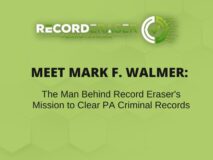
As we embrace the new changes introduced by Pennsylvania’s Clean Slate 3.0, it is no doubt a learning curve for us all, attorneys included. The new law, which expands the scope of eligibility for sealing records and shortens waiting periods, is a significant step toward reinforcing our belief in second chances. At Record Eraser, family owned and operated by Attorney Mark F. Walmer, our dedication to transforming lives through legal expertise continues to grow with these changes.
Understanding Clean Slate 3.0
Clean Slate 3.0, enacted as Act 36 of 2023, broadens the categories of convictions eligible for sealing, including some felony convictions for the first time. This reform, effective from February 12, 2024, also modifies the waiting periods for misdemeanor and summary convictions, making it easier and quicker for more Pennsylvanians to mitigate the impact of past mistakes.
Key Takeaways:
- Eligibility for Felonies: After 10 years, certain non-violent felonies related to theft, forgery, and fraud can now be sealed.
- Reduced Waiting Periods: The law reduces the waiting period for sealing misdemeanors from ten to seven years and summaries from ten to five years.
- Automatic Expungement for Pardoned Offenses: If you receive a pardon, your record will automatically be expunged, streamlining what was once a cumbersome process.
The Impact on Individuals and Communities
The broader eligibility criteria and streamlined processes introduced by Clean Slate 3.0 are not just legal victories; they represent significant personal and community triumphs. By reducing barriers to employment, housing, and education, this law facilitates not only personal redemption but also economic growth and enhanced community safety.
Community Benefits:
-
-
- Economic Growth: Clean Slate 3.0 isn’t just about clearing records; it’s about unlocking potential. Between 2008 and 2018, pardons granted in Pennsylvania allowed recipients to earn an estimated $16 million in wages1. By removing barriers to employment, this law can significantly boost earning capacity and encourage fuller participation in the economy. Individuals who once faced hurdles in securing good jobs can now look forward to increased financial stability.
- Simplifying Legal Processes: The law makes it easier than ever to clear past convictions. By streamlining the process of sealing records, Clean Slate 3.0 reduces the complexity that often discourages people from seeking expungement. This change means more Pennsylvanians can move forward without legal burdens hanging over their heads.
- Housing and Family Stability: A clear record opens doors—literally. With fewer barriers to housing, individuals and their families can enjoy greater security and stability. This is crucial, as stable housing is a cornerstone of a stable family life and has been studied that 79% of formerly incarcerated people and their families reported being denied housing due to a criminal conviction2. Breaking down these barriers are critical for a successful reintegration into society.
- Career and Educational Advancement: Education and career advancement are within closer reach with Clean Slate 3.0. Without a criminal record in the way, individuals can pursue higher education opportunities and career paths previously closed to them, setting the stage for a brighter future. A study from the Harvard Law Review found that within one-year, individuals who had their records expunged had employment rates rise from 75% to 84%3.
- Community Benefits: The positive ripple effects of Clean Slate 3.0 extend beyond individuals to entire communities. According to the Center for Economic and Policy Research, it is estimated that reducing employment barriers for people with criminal records could boost the U.S. GDP up to $87 billion annually4. More economic growth means more resources, which in turn provides safer, more cohesive neighborhoods that can emerge when more citizens are empowered to contribute positively to their surroundings.
- Quality of Life Enhancements: Ultimately, Clean Slate 3.0 improves the overall quality of life for those affected. Clearing a criminal record can relieve the emotional and psychological burden many carry, paving the way for a more hopeful and fulfilling future.
-
Navigating the Process
Navigating the new provisions of Clean Slate 3.0 can be complex. At Record Eraser, we are committed to providing clear, effective guidance to our clients. This includes understanding the nuances of which offenses are eligible for sealing and how to efficiently manage the petition process.
As we continue to learn and adapt to the intricacies of Clean Slate 3.0, our goal remains steadfast: to empower our clients by clearing the path toward a brighter and secure future. For more insights and assistance with navigating these new legal landscapes, fill out the form below or give us a call at 717.925.7820.
References:
- Spolar, Ellen. “Pardons as an Economic Investment Strategy: Evaluating a Decade of Data in Pennsylvania.“ Economy League.
- deVuono-Powell, Chris Schweidler, Alicia Walters, and Azadeh Zohrabi. “Who Pays? The True Cost of Incarceration on Families.” Ella Baker Center for Human Rights, Forward Together, Research Action Design.
- Prescott, J. J., and Sonja B. Starr. “Expungement of Criminal Convictions: An Empirical Study.” Harvard Law Review.
- Schmitt, John, and Kris Warner. “Ex-Offenders and the Labor Market.” Center for Economic and Policy Research.




